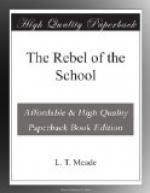“Now we are complete,” she said. “Listen to me, all you girls, for I haven’t too long in which to tell you; that horrid bell will ring us back to lessons and dullness in less than no time. The most wonderful, delightful chance is offered to us. I met her yesterday, and she decided to do it. She is a brick of bricks. She will make the most tremendous difference in our lives. You know, although you pretend not to feel it, but you all must know how we foundationers are sat upon and objected to in the school. We bear it as meekly as we can for the sake of our so-called advantages; but if we can be snubbed, we are, and if we can be neglected, we are—although it isn’t the teachers we have to complain of, but the girls. Sometimes things are past bearing, and yet we are powerless. There are three hundred paying girls, and there are one hundred foundationers. What chance has one hundred against three?”
“What is the good of bringing all that up, Susy?” said Mary Rand. “We are foundationers, and we ought to be thankful.”
“The education is splendid; we ought not to forget that,” said Ruth Craven.
Susy turned on Ruth as though she would like to eat her.
“It is all very fine for you,” she said. “Just because you happen to be pretty, they take you up. I wonder one of your fine friends doesn’t pay for you, and so save your position out and out.”
“I wouldn’t allow her to,” replied Ruth, her eyes flashing fire. “I had much rather be a foundationer. I mean to prove that I am every bit as good as a paying girl. I mean to make you all respect me, so there!”
“That’ll do, Spitfire,” said Kate Rourke. “The time is passing, and we must get to the bottom of Susy Hopkins’s remarkable address.—What’s up, Susy? What’s up?”
“This,” said Susy. “You know the Irish girl who has come to live with the Tennants?”
“Can’t say I do,” said Kate.
“Well, you will soon. She’s a regular out-and-out beauty.”
“I know her,” cried Ruth Craven. “She is most lovely.”
“She’s better,” said Susy; “she’s bewitching. See; she gave me this.” Here she pointed proudly to the Irish diamond brooch, which she had stuck in the bosom of her dress. The diamond had been polished, and flashed brightly; the silver setting was also as good as was to be found. The girls crowded round to admire, and “Oh, my!” “Oh, dear!” “Did you ever?” and “Well, I never!” sounded on all sides.
“You will be so set up now, Susan Hopkins, that we won’t be able to bear you in the same class,” said Clara Sawyer.
“Go on,” exclaimed Hannah Johnson—“go on and tell us what you want. Your horrid brooch doesn’t interest us. What have you got to say?”
“You are mad with jealousy, and you know it,” answered Susy. “Well, I am coming to the great news. The Irish girl’s name is Kathleen O’Hara, and she comes from a castle over in the wild west of Ireland. Her father is very rich, and he keeps dogs and horses and carriages and—oh, everything that rich people keep. Compared to the other girls in the school, she is ten times a lady; and she has a true lady’s heart. And she has taken a dislike, as far as I can see, to Alice Tennant.”




